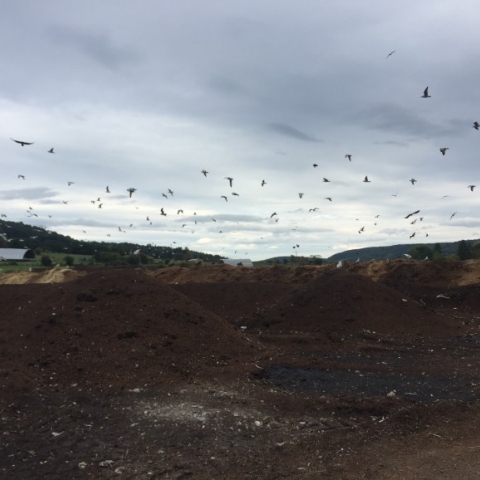
Cornell Daily Sun | Julia Curley, November 28, 2017
Cornell is truly the Gold standard in sustainability practices — according to AASHE sustainability metrics — with impressive green research support, community outreach and sustainable energy systems. But food and dining practices remain the weakest points in the University’s sustainable progress.
Of colleges that report every year, Cornell is the longest standing Gold member in the nation and the highest grading Ivy League school for overall sustainability scores, Hilary Paul ’19, Cornell’s student representative for sustainability statistics told The Sun. Cornell’s sustainable food and dining metrics, however, fall short of the Association for the Advancement of Sustainability in Higher Education standards.
Across the board, colleges and universities who report to AASHE’s Sustainability Tracking, Assessment & Rating System™ earn the lowest grades in sustainable food.
This continuously low STARS score, however, is not a blind spot in Cornell’s Sustainability office but rather an innovative area for the Food Focus Team who tackles this challenge everyday.
Cornell opened an award-winning compost facility in 1992. In 2012, dining halls went tray-less to discourage students and faculty from taking unnecessary plates and portions. Since 2014, Cornell Dining’s Student Sustainability Coordinators have conducted personal food waste studies in dining halls on both North and West Campus. And in 2016, Cornell adopted the “Menus of Change” initiative to increase environmentally responsible food choices.
These initiatives may have reduced Cornell Dining’s water and chemical needs — though There is no clear measurement in place for individual dining hall usage — but Cornell’s food sustainability rating has remained the same over the last three years.
The problem, said Michelle Shin ’19 an SSC and Sun dining writer, is that “reducing food waste is up to the daily or hourly actions of every individual.”
In order to combat the world’s third-largest emitter of greenhouse gases — food waste — communities must mobilize a holistic effort.
According to Sarah Brylinksy, Cornell’s Sustainability Communications & Integration manager, the upcoming Campus Sustainability Plan hopes to do just that.
Every five years The President’s Sustainable Campus Committee revises Cornell’s CSP with updated goals and renewed values. The current plan comes up for revision in 2018 and the brainstorming, outlining and drafting processes have already begun.
“The previous plan was less of a plan and more of a project-list,” Brylinksy told the Sun, “so this is really the first time that we’re setting innovative, high-level, campus-wide sustainability goals.”
Brylinsky emphasized the importance of setting “clear, smart goals.” A “smart goal,” to Brylinksy, is something as metric bound and visionary as the guiding force behind all of Cornell’s sustainability efforts: “Zero percent emissions by 2035.”
On November 9, the PSCC held its first public, goal-setting workshop for the upcoming sustainability plan. Over 70 people, including students, faculty and staff — all groups soon to be affected by the revised goals — attended the first workshop.
The PSCC wants full transparency and collaboration in the goal-adopting process.
So far, food sustainability goals include improvements to information access and education — in order to better inform Cornell eaters on how to make healthy and sustainable food choices.
“We’re doing a tremendous amount already to reduce waste, provide sustainable food options, provide a lot of healthy choices. We’re doing really well in the area of food” Brylinsky said. “Across the board, though, I’m finding that what people really want is education.”
The future of consumer food education may look like clear Carbon labeling to understand the greenhouse gas impact of various food choices.
In addition to education, Cornell continues progressing with waste technology. By the end of the year, Cornell Dining will implement the PHOOD program — an advanced software system for tracking and learning from food waste data — in North Star Dining Room, Willard Straight Hall, Robert Purcell Marketplace Eatery and Jansen’s Dining Room.
“I’m very excited to have this state-of- the-art waste tracking,” said Cornell’s senior executive chef Steven Miller. “This tool will enable us to show exactly where our opportunities are and we can then adjust to maximize our efforts.”
For now, the tool will focus on limiting pre-consumer waste but, according to director of campus life marketing and communications Karen Brown, Cornell plans to work directly with PHOOD to develop post-consumer tracking.
“The dining staff is such champions” said Brylinsky, “They have so many great ideas and they’re really doing everything they can to move the needle forward.”
Successful sustainable progress requires a collective effort, and the collaborative initiative for the CSP’s 2018 revision showcases this vital understanding of a group responsibility.
Cornell cares to do more — to buy even more local food products, to invest in new waste management products, to hear community members’ concerns and values — because change starts here, according to the Campus Sustainability Office.
“How are we supposed to send students and research out into the world if we’re not doing it here at home. We have to set the bar and say ‘yes, this is going to be hard but it is possible.’” said Brylinsky. “It’s possible to change our current unsustainable system into something that is a more just and equitable system for future generations.”
